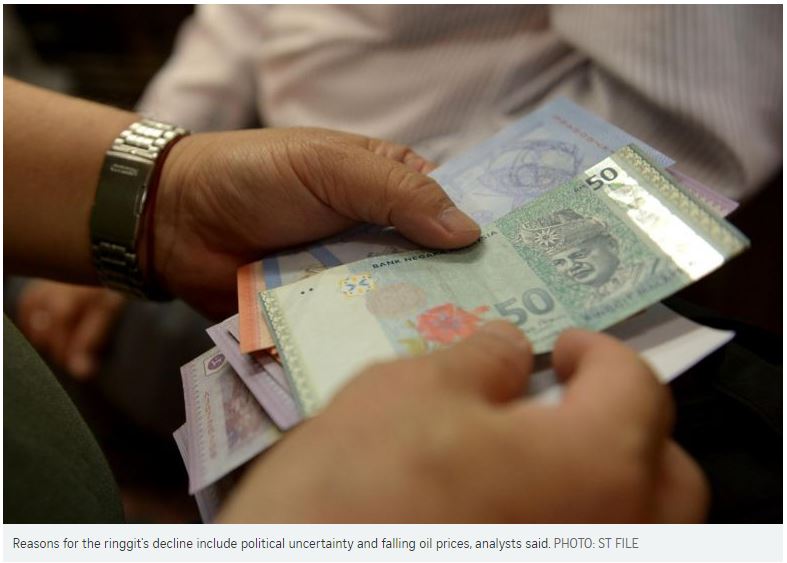Malaysian ringgit continues to fall against Singdollar
SINGAPORE – The Singdollar rose against the ringgit on Thursday (Dec 20), a trend that has continued since April, when the Malaysia ringgit was strongest against the Singdollar this year.
Then, one Singdollar could buy RM2.936. A check on Thursday showed that one Singdollar could buy RM3.0525.
Reasons for the ringgit’s decline include political uncertainty and falling oil prices, analysts said.
Another factor is the strong Singapore currency, they added.
Mr Chua Han Teng, head of Asia Country Risk at Fitch Solutions, said the ringgit’s decline could be attributed to weakness in oil prices seen since October.
The Singapore currency, however, “continued to benefit from a relatively stable Chinese yuan (as the two currencies have) a strong positive correlation with each other”, he added.
Mr Chua expects the ringgit to depreciate further against the Singdollar next year.
He said: “The ringgit will weaken due to continued political and policy uncertainty in Malaysia brought about by the ruling Pakatan Harapan coalition.”
Meanwhile, the Singapore currency will remain supported by the central bank’s “appreciatory stance on the Singdollar nominal effective exchange rate”, he added.
CIMB Private Banking economist Song Seng Wun said uncertainties in regional markets have strengthened the Singdollar.
“It’s a case of Singdollar strength on the back of safe haven demand… so regional funds are parked in Singapore as Singdollar,” he said.
He added: “The stronger Singdollar is definitely handy in containing imported food inflation, especially from Malaysia.”
Earlier this month, Malaysia, Singapore’s closest neighbour, said it is looking into limiting, or stopping, the export of eggs to ensure sufficient supply for the domestic market.
Earlier this week, Malaysia’s Deputy Finance Minister Amiruddin Hamzah said the government will work through Bank Negara Malaysia (BNM) to “make sure that the ringgit is stable via proactive measures to ensure sufficient liquidity and a resilient market”.
He said: “In the long term, the ringgit value would be driven particularly by the strength of the country’s economic fundamentals. Hence, Malaysia needs to focus efforts on increasing its economic resilience by diversifying revenue sources, and strengthen its fiscal position.”
Money changers told The Straits Times that the ringgit’s decline has translated to better sales.
At Aramex International Exchange at Sim Lim Square, managing director Barakath Ali said sales for the ringgit have picked up about 45 per cent this month compared with last month.
But the strong Singdollar may be one part of the equation to better ringgit sales, he added.
Mr Barakath, who is also first vice-president of the Money Changers Association (Singapore), said: “Demand for currencies usually increases during school holidays.”
Source: https://www.straitstimes.com/business/malaysian-ringgit-continues-to-fall-against-singdollar


 English
English




